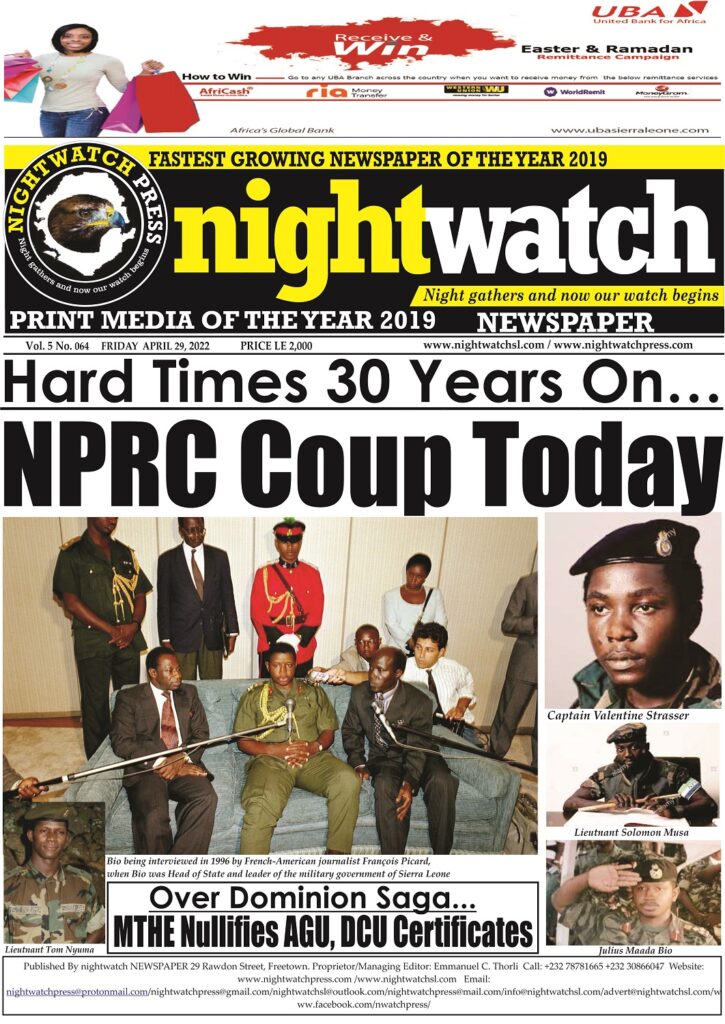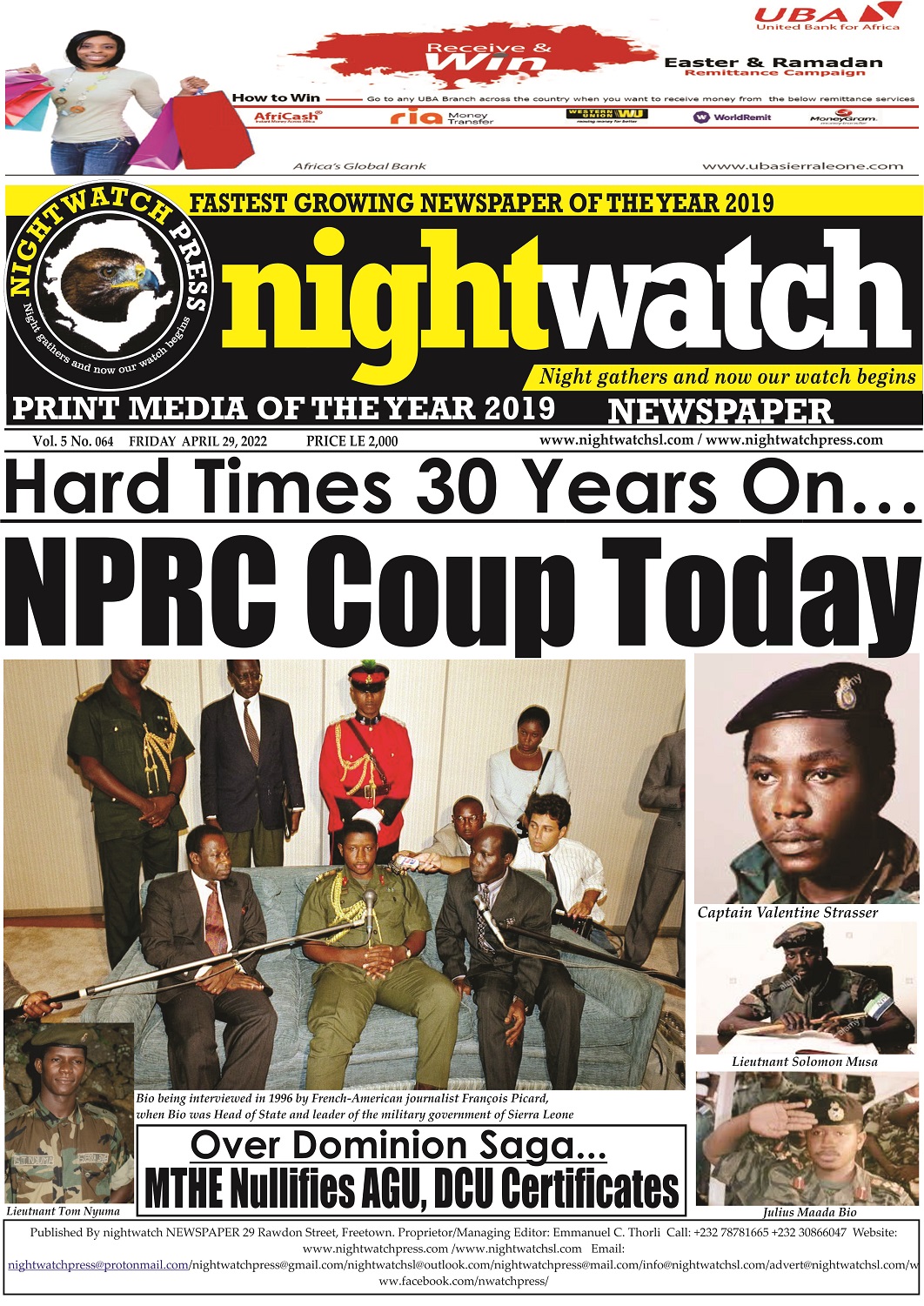It is 30 years today after the National Provisional Ruling Council forcefully took over state governance from President Joseph Saidu Momoh, then Head of State (1985-1992). The NPRC guys had it as their main rhetoric the reformers and redeemers of the nation.
Their aim, they argued, was to free Sierra Leone from what they referred to as economic stagnation, bad governance, oppression and tyranny among others. Captain Valentine Strasser, Lieutnant Sahr Sandy, Lieutnant Solomon Musa, Lieutnant Tom Nyuma, Captain Komba Mondeh and President Julius Maada Bio, a second Lieutnant at that time were the protagonists in what many writers referred to as a bloodless coup. Despite the rhetoric on reformation, Sierra Leone, to date, still continues to fester in the worst of conditions.
She is plagued by abject poverty, under-development, bad governance, inflation and economic maladministration among others.
Sierra Leone’s economic malaise today could be traced back to her immediate past dating from 1980’s to early 1990s.
One of the most marked event that took place in 1980 was the hosting of OAU (Organisation of African Unity (OAU) now AU (African Union) conference in Sierra Leone which landed Sierra Leone in a dire economic state.
Prices of basic goods and services spiralled out of control casting bleak future for Sierra Leoneans.
Short-lived Measures were however taken to stem the tide of the economic meltdown, but the hardship lingered. Not too long in 1985, President Siaka stevens handpicked a weak successor, Major-General Joseph Saidu Momoh who was confronted with the new and daunting task of rebuilding the economy.
Hopes were high that Momoh would turn the situation in favour of Sierra Leoneans owing to his military background.
He however wanted to be great by extending an Olive branch to all those in exile not knowing that great men make great mistakes.
Those Momoh brought home were men who had attempted on President Stevens’ life to take over state administration by the use of arms. Momoh Broke a moral injunction that says ‘Trust No One’ although nothing works without trust.
It was sad and horrific to learn that those Momoh trusted saw his back from power, and the ensuing extra-judicial killings, human rights abuse and suppression of free speech that occurred at that time were still kept alive by history.
Those men who were responsible for Momoh’s fall ruled for a while, and most have been swept away by the cruel hand of death.
Others still live around, but they are mere shadows of the glorious former selves. The unhappy end of those who took power through the use of arms is weighing hard on them.
The man who initially led NPRC, Captain Valentine Strasser today sits on a wheel chair with no one knowing what will happen in a moment.
One of them however occupies the nation’s highest office with little difference from his leadership in the NPRC regime.
Recent history has taught that President Bio graduated from the military academy as a second lieutnant in the Sierra Leone Army in October, 1987 at age 23, and his first posting as a commissioned officer was at the Lungi Garrison in PortLoko district in the same year.
Bio’s first appointment after NPRC coup was Secretary of State south stationed in the country’s second capital of Bo, but was later moved to Freetown to serve as Secretary of State in charge of Information and Broadcasting.
Bio was later promoted to captain alongside other junior lieutenants. Since Bio is a leading member in a coup that kicked out the APC government, Bio served as the Supreme Council of state member throughout NPRC’s stay in power.
He later became Strasser’s deputy following the dismissal and exile of the former deputy, Solomon Musa to the UK.
Many Sierra Leoneans accused Bio of disloyalty to his former boss, Strasser when he master-minded a putsch that saw the latter out of power over a dispute within the Supreme State Council.
Other members wanted to seek peace with the RUF before going into multi-party elections slated to take place in 1996 or go ahead with the elections regardless of the raging war at that time.
The counter-coup was backed by prominent army officers including Tom Nyuma, Komba Mondeh, Reginald Glover, Colonel Idris Kamara and Colonel Karefa Kargbo.
The clueless NPRC chairman, Valentine Strasser could not withstand the internal conspiracy of Bio and cronies. As head of State, Strasser lost the glory, courtesies and prestige of power when he was handcuffed at gun-point by military guards who should protect him.
He was immediately flown into exile in a military helicopter to Conakry, the capital city of Neighbouring Guinea.
Bio moved to the United States after his retirement from the military where he reportedly earned a Masters degree in International Affairs from an American university.
Bio fell foul with the American law during his stay there, and was deported.
A great chunk of his time was spent in the UK from where he bounced back to contest for elections in Sierra Leone in 2012 and 2018.
God was on Bio’s side when he clinched the presidency following the defeat, by a narrow margin, of Dr Samura Kamara, APC (All People’s Congress)’s flag-bearer.
Bio earned 51.8% while his rival, Kamara got 48.2%, an election international observers described as free and fair.
In his second coming to the seat of power, expectations among Sierra Leoneans and the international community on President Julius Maada Bio remained very high.
Sierra Leoneans expected Bio to lay to rest what they referred to as economic hard times while the international community hoped to see a culture of respect for human rights and dignity maintained by the Bio’s administration. Close to five years, Sierra Leone’s economic situation shows the worst indicators.
Water supply, food, electricity, health and other essential services are the most appalling in Mano River Basin and ECOWAS (Economic Community of West African States) sub-region.
On the national cohesion and human rights practice, Bio’s administration is nothing to write home about. The US Human Rights report of 2021 testifies to Bio’s brutal and blatant abuse of fundamental rights and freedoms of the people of Sierra Leone.
In his Independence Day address to the nation, Bio blamed the country’s hard times on the global economic meltdown.
“Our country, like all other countries around the world, has continued to wrestle with the immense global crises and the lingering effect of the COVID-19 pandemic. Global supply chains have been disrupted, and everything around the world is now more expensive in every country. Food, fuel and other goods are now more expensive in the United States, United Kingdom, France, China, Australia, India, Nigeria, Ghana, Guinea, and even in Sierra Leone than they were just a few months ago,” a portion of Bio’s speech reads.
Without any iota of doubt, the President is striving to convince Sierra Leoneans that economic hardship is not peculiar to Sierra Leone but takes part anywhere.
Even if the President’s claim is accepted, measures Bio embarks on remains to ease situation is another big question within public domain.
Biographical notes show that Bio, the man at the helm of affairs hailed from Tihun, a village in Sogbini Chiefdom in the southern district of Bonthe.
He went through his primary education in a Roman Catholic Primary School and completed his secondary education in Bo School which was a learning centre for sons of paramount chiefs in ages past.
Bio who was about to enrol on a degree course in Freetown after his Advanced Level exams when he changed his mind by joining the Republic of Sierra Leone Armed Forces in 1985, and deployed in several army units and at different locations.

He was later posted to Kambia district as part of the Economic Emergency Unit created by Joseph Saidu Momoh to combat smuggling and other crimes along the border between Guinea and Sierra Leone.
Bio was again reposted to Lungi and trained by United Nations Forces in Aviation security, and was later transferred to Benguema as a platoon commander.
In 1990, Bio was among a contingent of Sierra Leone Army posted to Liberia to the West African Peace-Keeping force to keep the peace in Liberia at a time the tiny West African country was in flames set by disorganised bands of guerrilla fighters. The fighters were fighting to over Samuel Doe’s government who saw as a dictator and oppressor.
Reports showed that thousands of Liberians were fleeing to Sierra Leone thereby exposing the country’s fragile security and adding to the economic hardship.
After a year in Liberia as an ECOMOG (ECOWAS Monitoring Group), the Sierra Leone government ordered Bio and several members of Sierra Leonean soldiers serving in Liberia to immediately return to Sierra Leone, and report to the Army Barracks in Daru, Kailahun district to add to the newly formed 600-man battalion of soldiers to repel the Revolutionary United Front rebels who had attacked villages on the border between Liberia and Sierra Leone in March, 1991.
The soldiers included such soldiers as Solomon Musa, Valentine Strasser, Sahr Sandy and Tom Nyuma. All these have today have left the shores of politics except Bio who shows an inclination to remain. But, 2023 is the deadline and a redline he would not cross.


